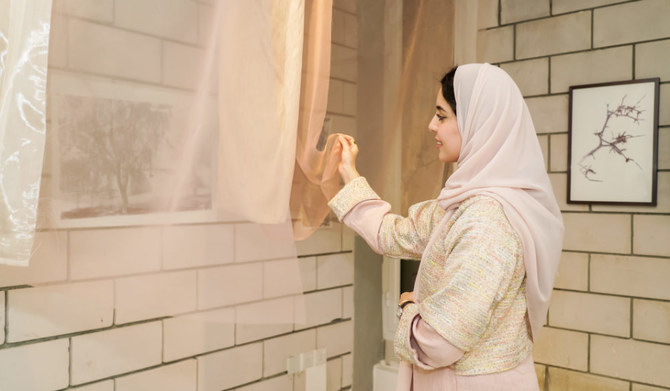RIYADH: Six ambitious Saudi photographers are showing their works on silkscreen at Prince Faisal bin Fahd Fine Arts Hall in Riyadh at an exhibition that concludes on Tuesday.
The exhibition follows the photographers’ micro-residency at Misk Art Institute, which had invited them to attend an intensive four-week course learning the technique of silkscreen printing.
The course gave them the creative freedom to choose a theme, take photographs, and then print them using silkscreen techniques.

Artists for Misk Art Institute for silkscreen printing microresidency speak to art admirers about their pieces. (AN photos by Huda Bashatah)
Six rooms are bursting with color and personality, reflecting each photographer’s creations.
Photographer Iman Falih tells her story through portraiture and street photography. The artist took photos of a colorful kite, and an old man with different facial expressions.
Falih believes self-expression is vital, and through her project she seeks to change some perspectives, such as older generations feeling the need to be more serious, and their tendency to wait instead of embracing life in the present.

Artists for Misk Art Institute for silkscreen printing microresidency speak to art admirers about their pieces. (AN photo by Huda Bashatah)
Falih said: “Life is sending us invitations every single day, but are we seeing these messages or are we even ready for them?
“We should enjoy and live, even in moments we consider small, because those moments are what makes the human experience what it is.”
Nada Alshahrani uses a cinematic approach to put her artistic focus on the feeling of passing time.

Artists for Misk Art Institute for silkscreen printing microresidency speak to art admirers about their pieces. (AN photo by Huda Bashatah)
She said: “A person wants to go back in time but is perplexed by negative and positive emotions.”
Her first work is a scenic view of a village about 1.5 hours from Riyadh. The first photo is covered by a fence and the second gives a clear view of the village.
“Each human has choices to make,” she added.

Artists for Misk Art Institute for silkscreen printing microresidency speak to art admirers about their pieces. (AN photo by Huda Bashatah)
Some photographers connect with their personal identity, and Gofran Tariq’s work integrates her two ethnicities: Sudanese and Saudi.
Tariq remembers seeing many of her grandfather’s old passports when she was younger, and they have inspired her art today. Photos of her father and her grandfather’s old passport stamps are printed in bright colors, resembling pop art.
She said: “My family mixes both traditions into their lives and this is how me and my family relate to both cultures.”

Artists for Misk Art Institute for silkscreen printing microresidency speak to art admirers about their pieces. (AN photo by Huda Bashatah)
Saudi photographer Hashem Alsharif was inspired by khubaiti, a type of dancing often seen at Hijazi weddings.
Alsharif said: “When I was a kid, khubaiti was prominent in our celebrations, weddings, and all our happy occasions.
“I wanted to shed some light on a happy memory of young me walking into a wedding and seeing this.”
Alsharif’s pieces capture the khubaiti performance in motion, reflecting a dynamic energy with bright colors of cyan, pink, and yellow.
Alsharif’s work also consists of prints of Middle Eastern instruments.
Hind Aldawish’s art focuses on the Arabian arta, an endangered desert plant that once bloomed across Najd.
She said: “The Arabian arta is now endangered and it is almost extinct.
“This used to be a source of life for many animals, especially camels who would heavily rely on this plant for food.”
Aldawish’s pieces are in black and white with the plant standing in the center of each photograph.
Artists have the chance to connect with themselves and escape from life’s complexities, and Mohamed Aljubran feels perplexed by an urban life that has limited access to nature.
Aljubran has shifted his focus to landscape photography instead of his usual street-style scenes.
He said: “The name of my work is ‘Land-escape’ and I hope it urges people to explore around us and escape to the land. Only through nature can you connect to yourself.”






























